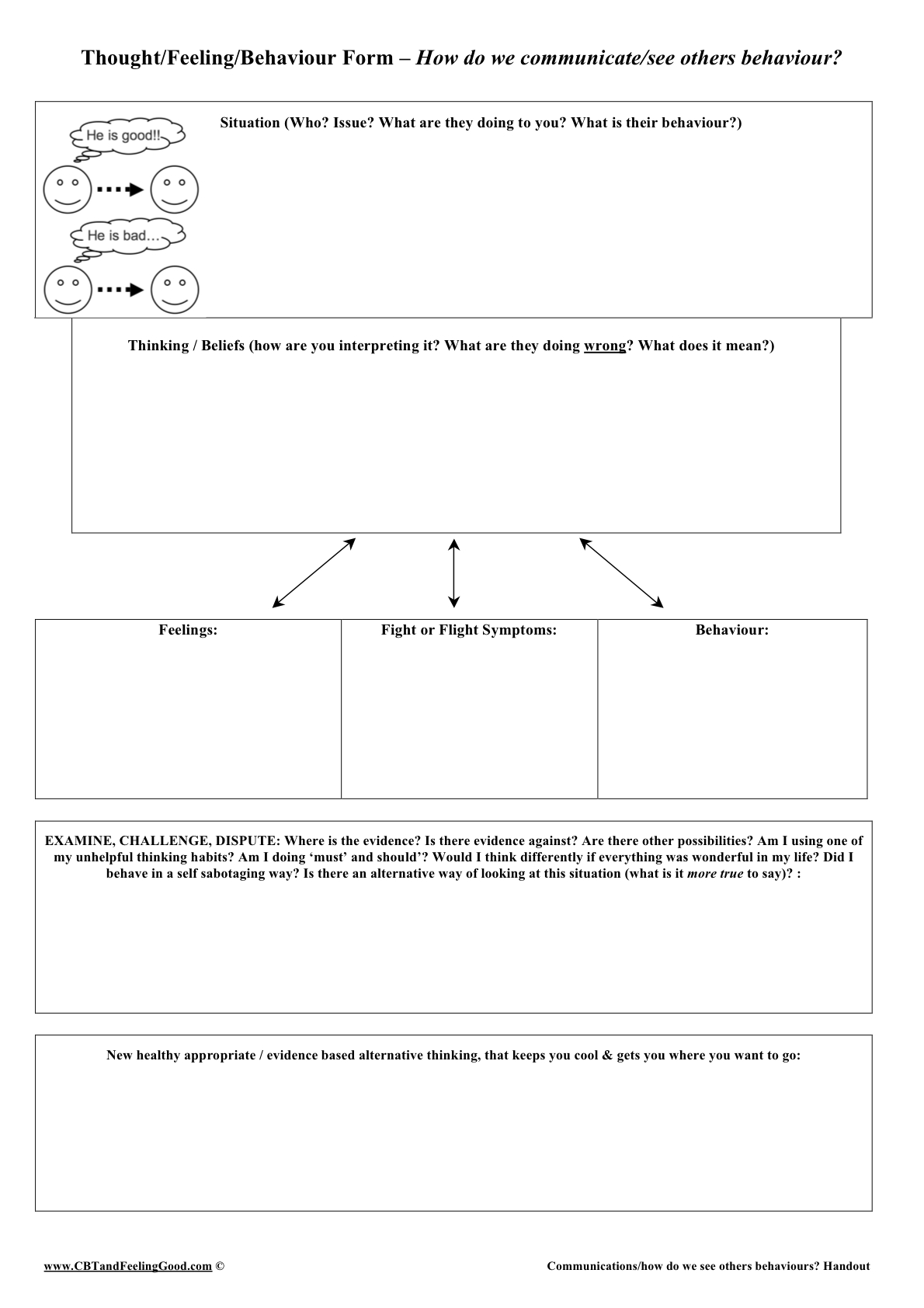
5 CBT Activities for Teens CognitiveBehavioral Therapy WA
Cognitive-Behavioral Therapy Worksheets (PDFs) To Print and Use. If you're a therapist looking for ways to guide your client through treatment or a hands-on person who loves to learn by doing, there are many cognitive-behavioral therapy worksheets that can help. 1. Coping styles worksheet.

CBT activities for school counseling Cbt activities, Individual
CBT is a form of psychotherapy that allows teens to identify and improve how they think, feel, and behave. There are many benefits of CBT for teens, including improved self-esteem and better self-compassion. CBT can tackle issues such as anxiety, stress, behavioral issues, and anger issues in teens. Adolescence is quite a rollercoaster ride for.

7 CBT Activities You Can Use in School Counseling Cbt activities
CBT Worksheets for Anxiety. Cognitive-Behavioral Therapy (CBT) treats anxiety by restructuring the client's thinking, with the therapist exploring maladaptive expectations and worries related to upcoming events (Dobson & Dozois, 2021).. 1. Anxiety Record. Reflecting on and sharing what makes us anxious can leave us feeling vulnerable, but it is essential.

Activities For Kids With Trauma / Épinglé sur kids / Education is a
The Think CBT workbook and worksheets are also available as an interactive/dynamic document that can be completed using mobile devices, tablets and computers. The interactive version of the workbook can be purchased for single use only for £25. All Think CBT clients receive a free interactive/dynamic copy of the workbook and worksheets free of.

17 Best images about Cognitive Behavior on Pinterest Cognitive bias
3) Make calm down jars. Calm down jars are another one of my favorite cognitive behavioral therapy activities for kids. They are easy to make and can be extremely soothing as they help decrease anxiety and fear while also helping with anger management. The act of shaking and watching the contents of a calm down jar settle forces the body to.

17 Best Images of Communication Worksheets Mental Health CBT Group
Cognitive behavioral therapy is an effective treatment for many mental health disorders and can be useful for children as young as six. Because of considerations like age and maturity levels, CBT for children and teens needs to be tailored to meet their needs. Most of the time, CBT is a short-term treatment and lasts 3-12

Group Activities For Teens, Support Group Activities, Music Therapy
Close your eyes and listen to the beat. Take a deep breath in for 3-5 beats of the music, hold your breath for 3-5 beats, and then breathe out slowly for 3-5 beats. Repeat, pairing your breathing with the music. Teach these games to someone you care about and practice at home (at least once a day). STOP THAT THOUGHT!

Pin on Group Counseling Activities and Lessons
CBT activities for teens can help them form healthy habits that will support them as they enter young adulthood. Key Takeaways. CBT intervention for kids can be a powerful part of an evidence-based treatment plan for adolescent mental health disorders, including substance abuse, eating disorders, PTSD, anxiety, and depression..

Cbt Worksheets For Teens Tools Worksheets Behavior Charts ADHD
Introduction. This workbook has been developed for use with teenagers who have experienced one or more traumatic events. The activities in the workbook correspond to the treatment components of the Trauma-Focused Cognitive Behavioral Therapy (TF-CBT) model, which was developed by Judith Cohen, Anthony Mannarino, and Esther Deblinger (Cohen.

CBT Activities for Kids How to Explain Thoughts and Feelings Social
Explore CBT Activities for Teenagers at Imagine Seattle. If your teen might benefit from cognitive-behavioral therapy, rely on our compassionate team at Imagine Seattle to help your teen with our CBT therapy programs. For more information about CBT therapy activities for teens, contact us online or at 425.295.2459 today.

Pin on Teen Coping Skills
Journaling. Journaling is another helpful CBT activity for teens. Writing about thoughts, feelings, and situations is one of the best ways to work through them. Often negative beliefs about ourselves or others go unchallenged. Teens might find journaling in private to be most helpful.

Pin on Psychology
Cognitive behavioral therapy, often referred to as CBT, is a type of psychotherapy that focuses on making connections between thoughts, behaviors, and feelings. Psychotherapists who use CBT help people identify and change dysfunctional patterns. CBT is often used with adolescents. It can be effective in treating a wide range of issues including.

Dealing with trauma a tfcbt workbook for teens Cbt Worksheets
worksheet. Early in cognitive behavioral therapy (CBT), clients will learn the cognitive behavioral model, and begin recording their experiences in a thought log. For many, the jump between these two tasks is difficult. The Cognitive Model: Example & Practice worksheet was designed to bridge this gap.

1000+ images about CBT for teens on Pinterest Ants, Cognitive
Children as young as 7 years old can benefit from cognitive behavior therapy (CBT) interventions, but it is important that the material is presented in an age-appropriate manner. 1. Download free CBT handouts and PDFs. Resources include thought logs, CBT models, behavioral activation, cognitive restructuring, and more.

5 CBT Group Activities for Teens CBT in WA
worksheet. Cognitive behavior therapy (CBT) is an evidence-based treatment for many mental and behavioral health issues. Research has shown that CBT can be effective for children as young as 7 years old, if the concepts are explained in a simple and relatable manner. Thoughts, Feelings, & Actions is a colorful and inviting 4-page CBT worksheet.

Cbt Activities for Kids Worksheets Wellness Printables
CBT WORKSHEET PACKET 2020 EDITION. Introduction. The worksheets are inappropriate for some clients, especially those who are not intellectually equipped to understand them, who become easily confused, who do not read or write well, or who have an aversion to filling out forms. In reality, many experienced cognitive